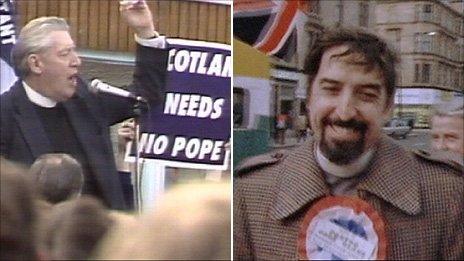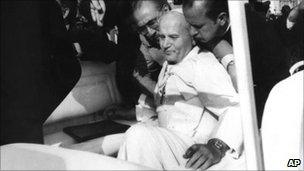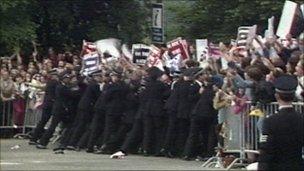A visit that nearly did not happen
- Published

Rev Ian Paisley and Pastor Jack Glass led the protests against the Pope's visit
Described by the Reverend Ian Paisley as "a bit of an extremist", Pastor Jack Glass was the Scottish face of anti-Catholicism leading the protests against the first Papal visit.
The hellfire preacher proclaimed the Pontiff had "no right to set foot on a Protestant island" and even stood as a candidate in the Glasgow Hillhead by-election on the issue.
Orangemen from Scotland and beyond were also outraged by the visit, and the Scottish Loyalist Association promised retaliation if their protests were barred by the authorities.
Archbishop Mario Conti told the BBC: "There were fringes in some of the churches - or some of the more fundamentalist in the churches - who were opposed to the whole notion of the visit."
John Paul II arrived in Scotland on 31 May, 1982 - four years into his Pontificate. By that time he had completed about a quarter of his 104 foreign visits - more than all the previous popes put together.

The Pope's security had been stepped up following the assassination attempt in 1981
Security was paramount, with the trip coming just a year after he had been shot four times in St Peter's Square.
John Dickson, Strathclyde Police co-ordinator in 1982, said the threats facing the Pope were very real.
He explained: "There was an incident that really hammered home the problems.
"We had a young man who was arrested by officers who saw him carrying something - it turned out to be almost a gallon of petrol.
"He was quite blunt about it and blasé. He said that he was a bigot and that he was going to try and disrupt the event. He was going to set a fire."
The run-up to the visit was also dominated by the conflict between Britain and Argentina in the Falkland Islands.
John Cooney, an Irish Times correspondent at the time, said the outbreak of war had thrown the whole visit into doubt.

Monsignor Dan Hart was told the Church would have to pay for police overtime if the visit was called off
"There was a perception in Argentina that the Pope going to Protestant Britain would've sent a signal to Latin American Catholics that he was taking sides," he said.
"It was a delicate call for the Vatican and it looked as though it was going to be off."
While attempts were made to find a compromise, preparations - which had been ongoing for a year - had to continue.
Monsignor Dan Hart, the 1982 Papal visit organiser, said: "One of the arrangements was that the cost of the police in Strathclyde was going to be covered on the basis that it was the equivalent of a state visit, which meant the church was not paying for it.
"However, the chief constable, Pat Hamill, said to me days before the visit, before we knew for certain that he was coming, that we had to make a decision.
"He said he had to get every police officer in Strathclyde on duty that day, give them seven days notice and must do it now. I had to decide if I was willing to let him do that.
"He said if the Pope comes I'm in the clear, if he doesn't, the church will have to pay for the overtime. I said 'we really don't have an option, we have to go ahead and hope for the best'."

Police restrained protesters during the Pope's meeting with the head of the Church of Scotland
A resolution was reached at the last minute - the Pope's visit was to be purely pastoral and his next trip was Argentina.
Despite a shaky build-up, both the war and protests failed to disrupt the historic occasion.
John Paul II was en-route to his meeting with the head of the Church of Scotland when a group of militant Protestants, including Ian Paisley, were shouting and throwing missiles as the Popemobile passed Edinburgh's New College. They were restrained by police.
Glasgow was also targeted by protesters, who marched through the city culminating in a demonstration near the landing site of the Papal helicopter in Bellahouston Park, where the Mass was being held.
Glass and Paisley were said to have led the crowd in shouts of "The Beast is Coming" and "No Surrender".
But the trip was remembered for its success, rather than controversy.
The First Pope in Scotland will be broadcast on BBC1 Scotland on Sunday 12 September at 1815 BST.